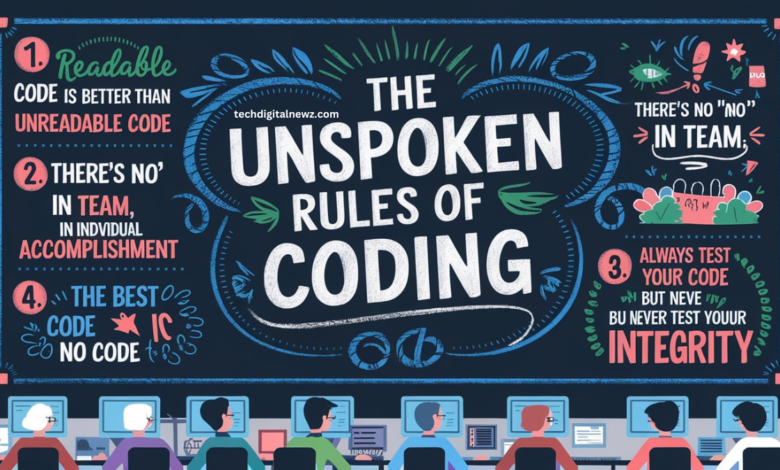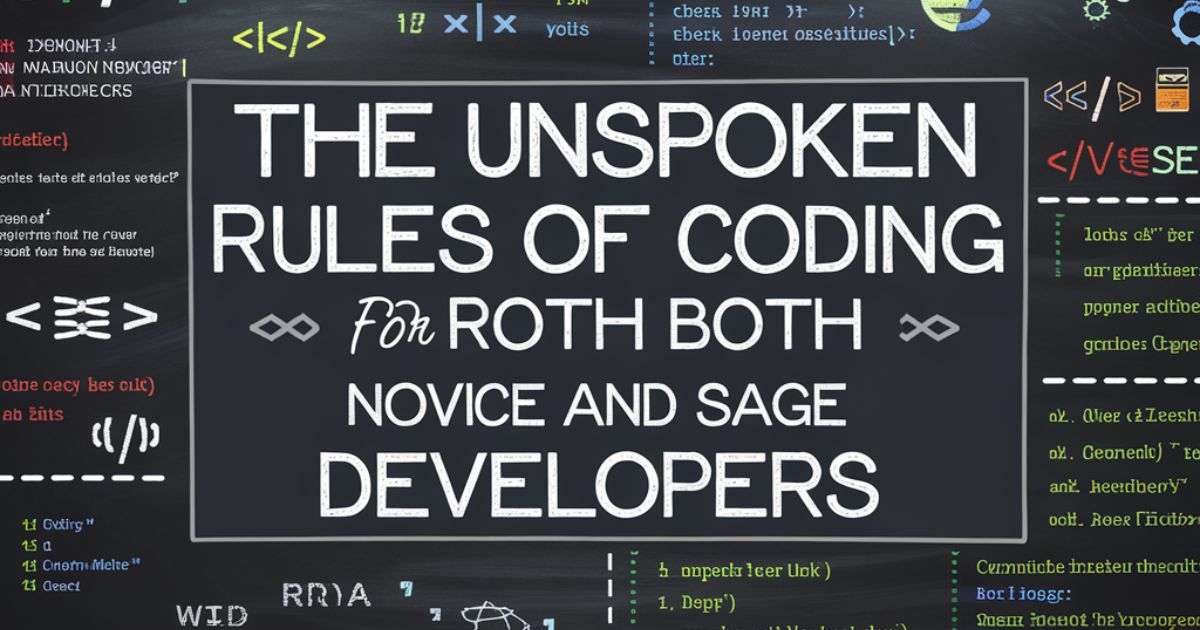The Unspoken Rules of Coding for Both Novice and Sage Developers

the unspoken rules of coding for both novice and sage developers Coding is more than a skill—it’s a journey of learning, adapting, and growing. While there are countless books and tutorials on programming languages, frameworks, and tools, the unspoken rules of coding often separate effective developers from average ones. These unwritten principles guide how coders approach their craft, collaborate with others, and continuously evolve. Whether you’re just starting or you’ve been in the field for years, understanding these rules can enhance your coding journey the unspoken rules of coding for both novice and sage developers.
the unspoken rules of coding for both novice and sage developers
1.1 Embracing a Growth Mindset
For novice developers, the initial phase of learning can feel overwhelming. Bugs, errors, and confusion are not roadblocks; they’re milestones. Adopting a growth mindset—one where challenges are viewed as opportunities—is essential. Celebrate small wins, such as successfully debugging a script or completing a basic project. Each obstacle is a stepping stone to mastery, and persistence is your greatest ally.
1.2 Writing Clean and Readable Code

the unspoken rules of coding for both novice and sage developers As a beginner, writing functional code might feel like the only goal. However, clean and readable code is equally important. Comment your logic, use descriptive variable names, and stick to coding standards like PEP8 for Python or Google’s Java Style Guide. These practices make your code easier to understand, not just for you but for anyone collaborating with you the unspoken rules of coding for both novice and sage developers.
1.3 Mastering Debugging Skills
Debugging is a core skill every coder needs. Start by understanding error messages—they’re often the key to solving problems. Learn to use tools like breakpoints or add simple print statements to isolate issues. The faster you become comfortable with debugging, the less intimidating errors will seem the unspoken rules of coding for both novice and sage developers.
1.4 Continuous Learning and Upskilling
Technology evolves rapidly, and the programming landscape is no exception. Regularly update your knowledge with online courses, tutorials, or coding challenges. Websites like freeCodeCamp, Codecademy, and Coursera are excellent starting points. Remember, coding is a marathon, not a sprint the unspoken rules of coding for both novice and sage developers.
Advancing Beyond the Basics: Lessons for Sage Developers
2.1 Mentoring and Knowledge Sharing
Experienced developers often find immense value in mentoring. Sharing your knowledge not only helps others but also reinforces your understanding. Mentorship improves team dynamics and fosters a culture of collaboration. Teach a novice today, and they might teach you something tomorrow.
2.2 Keeping Skills Relevant
The tech industry changes quickly, making complacency a risk. Sage developers must proactively explore new technologies, frameworks, and methodologies. Experiment with emerging tools and attend conferences to stay ahead of the curve. Continuous learning isn’t just for novices—it’s a lifelong practice.
2.3 Writing Scalable and Maintainable Code
Complex projects demand scalable and maintainable code. Adopt principles like modular programming, reusable components, and clear documentation. Implementing design patterns such as MVC (Model-View-Controller) can prevent your codebase from becoming a tangled mess the unspoken rules of coding for both novice and sage developers.
2.4 Ethical and Responsible Coding
Advanced developers have a responsibility to ensure their code serves users ethically. Be mindful of data privacy, security, and inclusivity in your projects. Bias in algorithms or overlooking accessibility can have serious repercussions. Ethical coding isn’t optional—it’s imperative the unspoken rules of coding for both novice and sage developers.
Navigating Common Challenges in Coding
3.1 Overcoming Impostor Syndrome
Even seasoned developers sometimes feel like impostors, doubting their skills despite evidence of competence. Combat this by documenting your achievements and seeking peer validation. Remember, learning is a lifelong process, and everyone started somewhere the unspoken rules of coding for both novice and sage developers.
3.2 Managing Time and Deadlines
Coding projects often come with tight deadlines. Effective time management involves breaking tasks into smaller goals, prioritizing urgent ones, and tracking progress. Tools like Trello or Asana can help keep your workflow organized the unspoken rules of coding for both novice and sage developers.
3.3 Dealing with Legacy Code
Legacy code—old, outdated codebases—can be a nightmare to work with. Take the time to understand the existing structure before making changes. Refactor incrementally and document your updates. Tools like Git can help manage these changes efficiently.
3.4 Handling Burnout in Tech
Burnout is a real challenge for many developers. Overworking leads to diminished creativity and productivity. Schedule regular breaks, practice hobbies outside of coding, and establish boundaries between work and personal time to maintain balance.
Cultivating a Developer’s Mindset for Lifelong Success
4.1 The Art of Problem-Solving
At its core, coding is about solving problems. Break complex issues into smaller, manageable tasks. Use flowcharts, pseudocode, or even whiteboard brainstorming to visualize solutions. Problem-solving is a skill that improves with practice.
4.2 Building Resilience in a Dynamic Industry
The tech industry demands adaptability. Embrace feedback as an opportunity to grow, and don’t fear failure—it’s part of the learning process. Resilience will keep you grounded in a field that’s always evolving.
4.3 The Importance of Networking and Community Engagement
Building connections within the developer community can open doors to opportunities and collaborations. Join forums like GitHub and Stack Overflow, attend meetups, or participate in hackathons. A strong network can amplify your career growth.
Conclusion
Coding is not just about syntax and algorithms; it’s about mindset, adaptability, and continuous improvement. By following these unspoken rules, novice and sage developers alike can enhance their craft, contribute to the tech community, and create impactful solutions. Coding is a journey where every line of code brings new opportunities to learn and grow.
You may also read
boston celtics vs dallas mavericks match player stats





